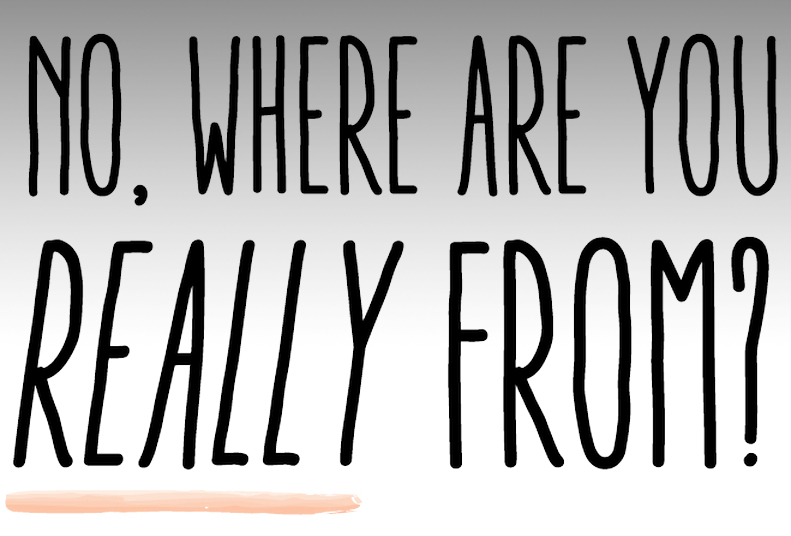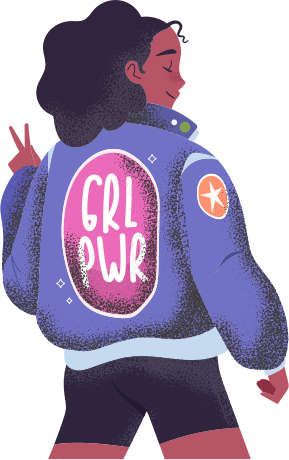As a woman with Southeast Asian ethnicity living in Europe you’ll stick out of the crowd more often than you’d like to. Particularly, because people never seem too tired to remind you over and over again that you are Asian and not white like the majority of the people surrounding you – as if you would otherwise forget about that fact. One way to do so is to ask the very popular question: ‘But, where are you really from’- which oftentimes comes after the first question ‘Where are you from’ – because people don’t seem to be happy with the first answer they get, so they ask for another. It’s like a sweater you tried on but you are not happy with, so you’d rather have it in a different colour. What people aren’t aware of is that they’re not asking where I am really from – because that question is already answered by me telling them that I grew up in Germany. What they are actually asking is ‘Why do you look different (than white people)?’ – thereby pointing out that you are a foreigner and implicating that you belong to the out-group and not the in-group – and no-one wants to belong to the out-group. No-one wants to feel left out or excluded. It doesn’t matter how many times your mom tells you you are special – you just want to belong.
Other ways to remind you of your otherness involve the use of stereotypes, like: ‘You’re Asian, so you must be good at school, huh?!’ And then, when you answer with something like ‘Well, that’s racist’ – people get defensive which in turn leads to an even more awkward situation. One time, I was travelling by myself and staying at a hostel. I was waiting in the lobby for a friend when I noticed a Caucasian woman in her sixties staring at me from the other side of the room. A couple of minutes later, she sat next to me and asked, ‘Are you from Hong Kong’? I said ‘No, are you?’ (in my mind I was giggling about my joke but I guess you needed to be there to understand my amusement). She said ‘No’ (unfortunately, unaware of my joke) and asked again (because asking that question once didn’t seem enough): ‘Are you from Hong Kong’. I said ‘No’ – again. She followed up with: ‘Are your parents from Hong Kong – I am searching for people from Hong Kong.’ I have had enough of these questions by then, so I replied ‘No they are not, and it’s racist to assume that I am.’ She was quite puzzled by my answer, started muttering something in a low voice that I couldn’t understand and looked down at a magazine she was suddenly fiddling with. I got back to the book I was reading while waiting for my friend. After a few minutes, she stood up, walked around the lobby a bit disoriented and sat down at the other side of the room, probably pretending this all never happened.
I do understand that in many cases, people don’t mean any harm by pointing out my foreign looks – sometimes they are just confused. They are confused by seeing someone looking different than them. They are confused by me being Southeast Asian while not living in an Asian country but in theirs. They are confused by me looking Asian while speaking a non-Asian language. But does it really matter what the root cause for making me uncomfortable is? The feeling of being different, excluded and of potentially not belonging to the in-group remains – no matter why people needed to make me feel this way. I remember the look of my then (white) boyfriend’s (also white and conservative) mother staring at me when we met for the first time. She stared at me like many others have done when realizing I had a Southeast Asian look but am at the same time capable of speaking German fluently. This simple fact of looking ‘non-German’ but speaking their language doesn’t make sense for many people. You can actually see in their face how hard their brains are working as if they were to find a solution to a difficult mathematical problem. They try to understand how a person could be Asian but still speak their language – two things that can’t possibly go together for them.
When thinking about how to avoid such uncomfortable situations for the future, how to educate people about the negative effects of stereotyping and how to resolve the challenges that people and particularly women of color are confronted with, there doesn’t seem to be way around for us to speak up when it matters. When I lived in Berlin, I had this acquaintance that I used to bump into every now and then. Each time we saw each other, he made a comment about my Asian ethnicity. When I was with non-Asian friends he would comment that we look like the most politically correct group of people since my ethnicity made sure we were diverse enough. Another time during my studies, I was on my way to the library when I met him. When he learned that I was going to the library to study he responded: ‘Of course you are, Asian’s always study a lot!’ I didn’t pay much attention to his comments but after the 5th remark he made about my appearance, I started realizing, and without thinking much about it I said: ‘Have you noticed that each time we see each other, you always start our conversation with a racist remark about my Asian ethnicity?’ I didn’t even want to be mean or to lecture him. It was just an observation that I verbalized. I don’t remember his exact reaction to that but I believe we continued our conversation with some small talk and then went our different ways.
A couple of years later, I saw him again at a gallery opening. He came up to me and said: ‘Do you remember that last time we met; you told me that I would always make a racist remark about your Asian looks when we talked? I am really sorry for this. I wasn’t aware and didn’t do it on purpose. I thought about what you said and now I try to be more aware of the things I say.’ I was touched. I have long forgotten about this incident, but he apparently didn’t. I couldn’t believe that me telling him about my observations actually changed his behaviour in some ways – for the better.
I was lucky to have spoken up to a considerate and reflective person. Of course, not every time we speak up will lead to such a positive outcome. Many other times when speaking up, people would get offended and try to explain themselves first before actually reflecting on their behaviour. Odds are, that we need to deal with such uncomfortable encounters in the next years to come. But I hope that the more we speak our mind, future generations of women of colour will deal with less and less racist encounters that make people feel excluded and reduced to no more than their looks – at least in the long term. I hope that with more people speaking up, education will leave positive marks in society and increased awareness and grassroots initiatives will lead women of colour to be more empowered and less exposed to racist behaviour.
For the midterm, I hope underrepresented groups of people like women of color learn how to deal with such as uncomfortable situations in a way that it doesn’t bring them down. I can only remember how many times racist interactions with others brought me down, made me feel excluded and reduced to no more than my ethnicity. When people are ‘confused’ by women of colour being able to do all the things that others can, too – such as speaking a non-Asian language – it’s not our fault. We shouldn’t need to deal with their confusion in a bad way. If they are irritated by who we are, just let them. It shouldn’t be our problem. So, keep this in mind, fellow women of colour, when you are once again confronted with other people’s ignorance and disability to honour diversity.
For the short term, I can only recommend and hope for us to keep on confusing people. If our being irritates others, just keep on going nevertheless – not despite the confusion it’s causing but because of it! Keep on calling out inappropriate expressions and negative stereotypes and show off your skills and personalities. Because my hope is that at some point, people will stop being confused, but start to learn. Calling out racist behaviour is uncomfortable for all parties involved. It didn’t make me particularly happy seeing a woman in her sixties to be shaken up because I called her remark racist. But if we don’t call out such inappropriate behaviour and remarks that do seem racist and particularly uncomfortable for us and others – who will?
It also didn’t make me feel comfortable having my then quasi mother-in-law staring at me like I am a species from beyond. But do I need to deal with her confusion? Do we need to feel ashamed or reduce ourselves despite all the things we are capable of? No, we don’t and we need to remind ourselves of that. My hope is that the confusion we cause will make people reflect on their behaviour for the better. My hope is that we speak up no matter how inconvenient it may be for all parties involved. In fact, I believe the more uncomfortable the situation, the more people are inclined to reflect on their behaviour. My hope is that even the woman in her sixties whom I irritated with my remark will reflect and think about my words for the better, just like the guy did after me calling out his racist remarks. And hopefully, people will stop seeing only the colour of our skin but our personalities. So, let’s keep on confusing people to make society a better place for future generations of women of colour.
—
Milan Nguyen works at Google as an Automation Specialist and UX Researcher. She is also co-founder of the collective of artists Tape That whose story she spoke about as a Speaker on TEDxLSE. Besides making it her mission to make communities a more creative space with her project Tape Art Project, she also speaks out for gender equality and engages in feminist initiatives to empower women of colour in society. Follow her Instagram account @milan.ovich and get in touch!



